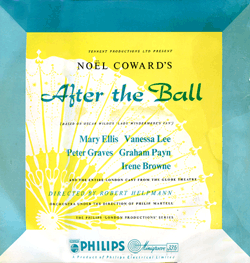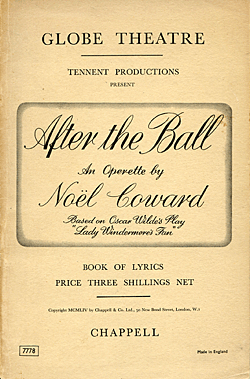After the Ball
Coward decided to base a musical on Oscar Wilde's play, Lady Windermere's Fan, in August 1953 and worked on it until January 1954. He delegated the first draft of the script to his assistant Cole Lesley. Lesley "cut out the more glaringly melodramatic of Wilde's lines and divided the remainder into sections ending with a suitable 'cue for a song'" "I know that it is very good indeed," wrote Coward of the finished piece, "I have... turned out some of the best lyrics I have ever written" Coward worked on the piece during his customary winter holiday in Jamaica in December 1953. His music director, Norman Hackforth, flew to Jamaica to help him finish the score after Christmas.
Coward cast Mary Ellis in the leading role of Mrs Erlynne, unwisely accepting without audition her assurance that, in her late fifties, she was singing as well as ever. Hackforth soon realised that she could not adequately sing Coward's difficult music for the role. In Coward's absence, Hackforth reluctantly cut the most challenging music for the twelve-week tour opening in Liverpool on 1 March 1954, but he was still dismayed by Ellis's delivery of the music. Coward returned to England at the end of March and saw the production at Bristol on 1 April. He was distressed by what he saw and heard: "the absence of style in the direction... a great deal of the performance was inaudible.... Vanessa [Lee] sang divinely but acted poorly. Mary Ellis acted well but sang so badly I could hardly bear it. The orchestra was appalling, the orchestrations beneath contempt, and poor Norman [Hackforth] conducted like a stick of wet asparagus."
Coward immediately began major rewriting, reorganization, reorchestration and cutting of the show. He fired his old friend Hackforth as musical director. Hackforth remembered, "If [Coward] had struck me across the face and told me I was no bloody good it would have been less painful!" Coward engaged Phil Green to reorchestrate the score and revised much of Helpmann's production, but he was still "terribly disappointed about After the Ball. The whole project has been sabotaged by Mary not being able to sing it. Unfortunately she is a strong personality and plays it well, otherwise I would of course have had her out of the cast weeks ago." He was still more forthright to his friends Alfred Lunt and Lynn Fontanne: "I have been having a terrible time with After the Ball, mainly on account of Mary Ellis's singing voice which, to coin a phrase, sounds like someone fucking the cat. I know that your sense of the urbane, sophisticated Coward wit will appreciate this simile." In London, reviews were mixed: "The daily Press was idiotic as usual but well-disposed and good box-office. [The Sunday papers] are, on the whole, very good, particularly Harold Hobson in the Sunday Times." The show ran from 10 June until 20 November 1954.
In retrospect, the director, Robert Helpmann, wondered whether the attempt to combine Wilde and Coward was ever likely to have worked: You would have thought that a play of Wilde's with music by Noel Coward should be marvellous, but I suddenly realised at the first rehearsal it was like having two funny people at a dinner party. Everything that Noel sent up, Wilde was sentimental about, and everything that Wilde sent up Noel was sentimental about. It was two different points of view and it didn't work."
Synopsis
In 1899 London, the upper crust gather at Lord and Lady Windermere's London house for a spectacular ball. Lady Windermere at first ignores the gossip that she has a rival for her husband's affections, an older woman called Mrs Erlynne, but she eventually confronts Lord Windermere with the accusation. He admits that he has been paying money to Mrs Erlynne but denies that he has had an affair with her and refuses to say more. In fact, Mrs Erlynne is Lady Windermere's mother, whom her daughter believes to be dead, and Lord Windermere is paying her money to keep her from revealing the relationship.
Lady Windermere, still believing the worst of her husband, is tempted by the amorous advances of the debonair Lord Darlington and agrees to visit him at his flat. Mrs Erlynne, learning of this before Lord Windermere, rushes to Darlington's flat to prevent her daughter from committing a destructive folly similar to that which she herself committed twenty years earlier. Without letting Lady Windermere know that they are mother and daughter, Mrs Erlynne persuades her that a liaison with Lord Darlington would be disastrous, but before they can leave, Lord Windermere arrives. The ladies conceal themselves, but Lord Windermere discovers the fan that he has recently given his wife as a birthday present and demands to know if Lord Darlington has Lady Windermere in his rooms. To prevent the exposure of Lady Windermere, Mrs Erlynne enters, saying that it is she who is under Lord Darlington's roof and must have picked up Lady Windermere's fan by mistake.
Lady Windermere's reputation is saved, but Mrs Erlynne's is compromised. Fortunately, her admirer, Lord Augustus Lorton, is convinced of her honour and proposes marriage. The Windermeres are reconciled, and all ends happily. Lady Windermere never learns that Mrs Erlynne is her mother.
Musical Numbers
Oh, What A Century It's Been, I Knew That You Would Be My Love, Mr. Hopper's Chant,y Sweet Da,y Quartette, Crème De La Crème, Light Is The Heart, Why Is It The Woman Who Pays?, London At Nigh,t Aria, May I Have The Pleasure?, All My Life Ago, Faraway Land, Something On A Tray, Clear Bright Morning.
Recordings
Original LP Phillips BBL 7005
Part 1: Oh, What a Century It's Been (Chorus) I Knew That You Would Be My Love (Vanessa Lee and Peter Graves) Mr Hopper's Chanty (Graham Payn, Dennis Bowen, Tom Gill) Sweet Day (Vanessa Lee) Oh, What a Century (Lois Green, Pam Marmont, Dennis Bowen, Tom Gill) Creme de la Creme (Chorus) Light Is the Heart (Mary Ellis) Why Is it the Woman Who Pays? (Chorus)
Part 2: London at Night (Chorus) Lady Windermere's Aria (Vanessa Lee) May I Have the Pleasure? (Graham Payn and Irene Browne) All My Life Ago (Mary Ellis) Faraway Land (Graham Payn and Patricia Cree) Something on a Tray (Irene Browne, Betty Felstead, Anna Halinka, Alisa Gamley) Clear, Bright Morning (Vanessa Lee) London at Night (Chorus)
Conductor Philip Martell; orchestrations by Philip Green. [June 1954]
CD: Sepia 1043 (2005)
As above but with the inclusion of 7 songs by Mary Martin and Graham Payn, from Sigh No More and Pacific 1860, and two unrelated tracks by Vanessa Lee.
Reviews
"One of Noël Coward's difficulties in turning Lady Windemere's Fan into a musical comedy is that, not unnaturally, he find sthe Victorian period funny, so that, although he uses some of Wilde's epigrams in addition to his own, he cannot escape a spoiling note of burlesque. The song 'Why Is It The Woman Who Pays? is in his best vein, but its sentiments are very far from Wilde. And a graver obstacle is the basic melodrama of the original. This involves him at moments of crisis in operatic ding-dong which is heavily undramatic and slows up the second act badly, as well as forcing on Mrs. Erlynne a long explanatory monologue sounding like a plot synopsis at the top of a serial.
In other words, the tincture of Wilde is a very uncertain asset, but if one can forget it there is still a good ewal in After The Ball to be enjoyed simply as a musical comedy. Mr. Coward has written pleasing music and a number of extremely nimble lyrics. Robert Helpmann, having good voices at his disposal, has seen to it that they are sunbg with maximum effect, and Doris Zinkeisen, although i found her sets a little dull, has dressed the production charmingly. the cast is by no means uniform in style - Shamus Locke's Lord Darlington, for instance, is the wrong kind of Irishman - but Mary Ellis and Vanessa Lee are impressive as Mrs Erlynne and Lady Windermere, Irene Browne scores as the outrageous Duchess, and Mr Hopper and Mr Dumby are particularly happy with Graham Payn and Dennis Bowan. The ecstatic little ballet in which Mr Hopper and Lady Agatha (Patricia Cree) celebrate their engagement must have given Mr. Helpmann as much pleasure as it does us." Erik Keown Punch 1954


